#myths of may
Text
Tang in dresses I think he'd like :3c
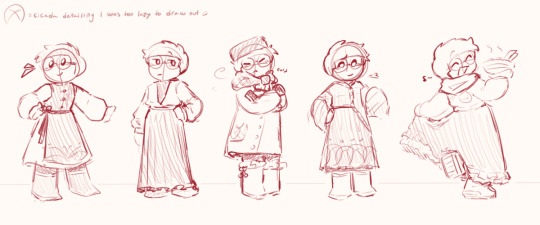
#Self indulgent post tbh dresses are so fun to draw and he looks good in them#He looks good in anything long and flowy tbh#Dresses chosen partially because I like them and partially because I think he'd be comfy in them too#I say dresses but it's kind of skirts too actually woops#They're all pretty casual I think? I don't know how formal wear works 💀#Gender is a myth that I refuse to adhere to let him wear dresses Lego!!!#One of his friends compliments him on a dress one day and he says smth along the lines of “yeah I know I slay” with-#complete confidence and everyone in the room takes mental damage#he may be pretty but he is still cringefail#lego monkie kid#monkie kid#lmk#lmk tang#monkie kid tang#zaacoy art💫
527 notes
·
View notes
Text
i think a true fulfilment might be a myth. at this point
159 notes
·
View notes
Text

Teenage war criminal #2 Pyrrhus
#Too much Achilles not enough of his deranged son#He is in fact a snake nourished with poisonous herbs whos hidden all winter but has now emerged#He’s in the Aeneid for like 2.5 seconds and caused maximum damage at like the ripe age of 17#I love that third(?) gen of heroes yknow orestes electra pyhrrus they’re just fucking shit up#This is not tsoa pyrrhus he may be a war criminal but he’s not homophobic most confusing characterisation ever#Greek myth#pyrrhus#the aeneid#the iliad#?#my art#mythology art#(This is based on a photo of Gerard way as Joan of arc btw if u even care
177 notes
·
View notes
Text
Circe Saga Countdown: 16 days
Circe fun fact of the day: Circe’s father is Helios, and her mother is the ocean nymph Perse!!! (Some versions have her being the daughter of Hecate, but this is the one I know)
#Epic the musical#epic the Circe saga#epic the Circe saga countdown#As always disclaimer the myths I know may be different then the ones you know!
87 notes
·
View notes
Text


more
#roblox#roblox myths#selozar#g0z#yukc0#z00zy_q#circus in the sky#i may have a problem#they inspired one of my roblox characters i love them sm#roblox myth
246 notes
·
View notes
Text
God. What if Pandora didn’t want to open the box. What if she was manipulated, her hands tied to and guided by strings she couldn’t shake off. What if when she released the horrors out into the world, Hope chose to stay with her, in the box. What if Pandora couldn’t rid herself of that guilt. What if Hope couldn’t convince her that not all was lost, and that she wasn’t responsible for the strings around her hands. That she wasn’t a monster.
What if Pandora and Hope found a way to trap everything in the box again. What if Pandora couldn’t do it. What if she didn’t want anyone else to feel the guilt she did. What if she thought that trapping the horrors in the box would just doom everyone into the same cycle. What if she felt she had to break it by bearing the suffering of everyone else. What if Hope tried to convince her that it could be better. What if she wouldn’t save herself. What if Hope had to kill Pandora for a chance to save everyone, including her. What if they both were sealed in the box. What if no one ever knew what happened to them. What if their last words to the world and to each other were “I love you.”
What if the world ending was never Pandora’s fault, but in her guilt and grief she blamed herself for it, and the Hope that voluntarily stayed by her side had to take her life to save it.
What if?
#ive been sorta rotating this around my brain the past week or so.#yeah.#anyways.#i will NEVER be over this#i just. once saw someone refer to martin as the ‘humanity that they’re saving and will save them’ or something along those lines#and well. hope and humanity are kinda the same thing arent they?#hell i think in some versions of the myth hope is actually referred to as humanity#and this just started rattling around my head#but i can’t quite get the words right#im going to post it anyway. because better to have written down something than nothing at all.#but i can’t quite get the words right.#it has however also made me realize that jumanji is also pandoras box#which is kinda funny#the magnus archives#mag 200#pandoras box#jonathan sims#martin blackwood#i guess now that ive processed it for a week or so. its time to listen to the post-season content and start the magnus protocol.#actually it may have been two weeks. i don’t remember when exactly i finished it.#anyway.#its late i need sleep.#tma#the magnus archives spoilers#tma spoilers#tma s5 spoilers#tma finale spoilers#how to tag this so that anyone listening for the first time does not see………
54 notes
·
View notes
Text
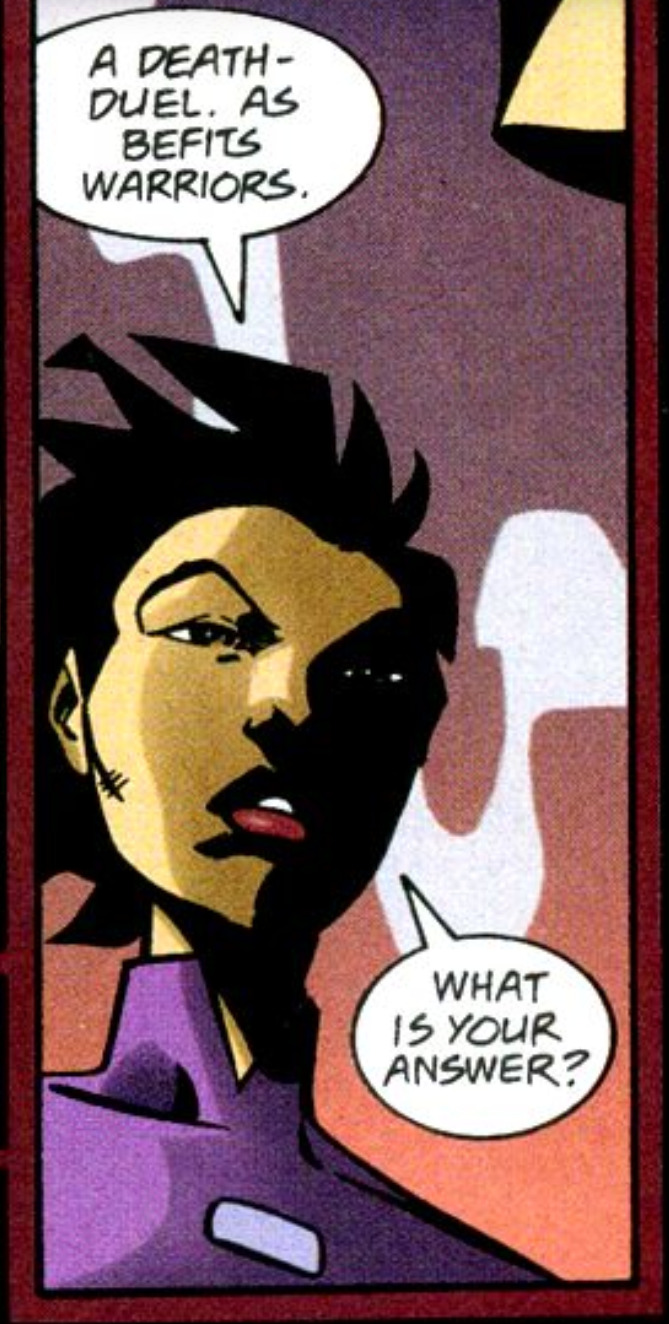
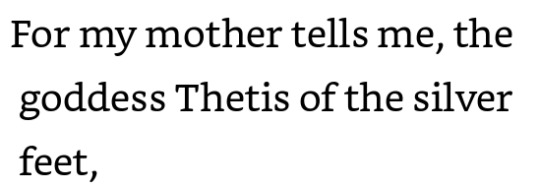


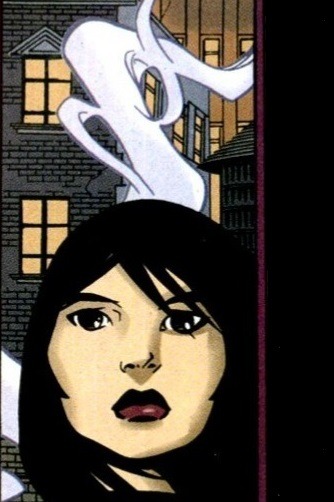
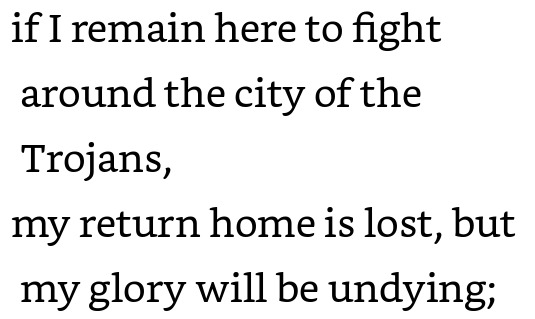


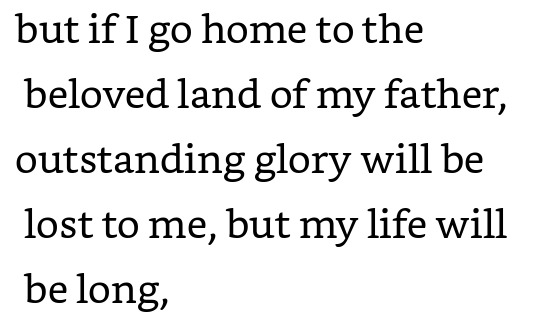
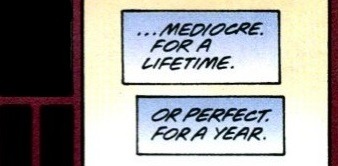



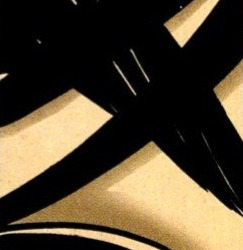
Batgirl #9 (2000) // the Iliad trans. Caroline Alexander // Táin Bó Cuailnge trans. Thomas Kinsella
#cassandra cain#dc#batgirl#batman#web weaving#I've wanted to make this post for years now#when I first read this scene in the comic I almost screamed!! the choice between a short life and glory or a long life and mediocrity. just#AHHHHHHHHH#anyway DC should do more with this Cassandra Cain is SUCH an interesting character with#the way she shares characteristics with classic heroes of myth and legend#I mean all superheroes do to a certain extent#but they're usually not this overt#may never do this again lol I have zero programs for this and it took forever#but also the more I focused on it the more parallels I found#Achilles and his mother#Cass and Lady Shiva#heck even to some extent Cúchulainn and Cathbad#who may or may not be his grandfather#if Cass chooses to get Shiva's help she'll have to come back in a year to fight to the death (and she expects to die)#if Achilles chooses to fight the Trojans he'll die during the war#if Cúchulainn picks up those weapons (choosing to fight for glory) his life will be short#if Cass chooses to do things Bruce's way (choosing her father) she'll can be Batgirl again#but never with the same skill level#if Achilles chooses to return to his father's land he will never achieve fame and glory but he'll live a long life#you can't really see it in these snippets but Cúchulainn's already made the choice and it can't be taken back#but you could parallel it with Conchobar's anger or with Cathbad's prediction of woe coming to that child#they're his mother's family but they are the paternal figures here#and in the end all three choose perfection and glory and fame over a long life of mediocrity#ANYWAY I find it fascinating#dc once again please hire me
62 notes
·
View notes
Text
L.M. Alcott writing Rose in Bloom 🤝 L.M. Montgomery writing The Blue Castle
Writing a novel very obscure as compared to their popular works with couples that are so overtly Eros and Psyche-coded that you just want to lay facedown on the floor and sob into your carpet. (Also, having the same first two initials)
#the way that they both play with the myth is so different but so wonderful too#ugh feeling the urge to reread both of these#the blue castle#rose in bloom#louisa may alcott#lm montgomery
39 notes
·
View notes
Text

𓇻 ft. shay cormac x assassin recruit gn reader
𓇻 warnings! minor spoilers for AC Rogue. alcohol consumption + minor injury.
𓇻 au. reader is Hope and Liam's newest addition to the Brotherhood. Unfortunately, you've just learned about Shay's involvement... long after you've already met him.
𓇻 enjoy! feel free to like, reblog, or send in asks!
read on ao3! - masterlist - join the taglist!
───※ ·❆· ※───
"Looks like you've got a right shiner this time."
It's a voice you recognize, even through the thick of the fog. With bottle of brandy in hand, opening to your bottom lip, you've managed to cool the swell of your ego better than you have your bruise. Tongue darts out, pushing at your upper lip.
His glove rests to your cheekbone, index finger trailing softly over tender skin. Never tender enough because you flinch instinctively, expression pulling tighter. Guarded was never a flattering expression on Shay and it certainly wasn't now. Nose wrinkling, you incline your head away, the cold now freshly stinging.
Even though it's been a few hours, the tenderness hasn't gone down, still bitter and sitting coloured beneath the flush of your skin. At least you've managed the swelling some.
The ghost of Shay's fingers on your skin lingers. You turn away, nursing the bottle with another sip. With a low, wanting creak of wood, the saloon's deck groans beneath Shay's weight as he shifts, back turned towards the banister, eyes always on you. Elbows resting over the rails, fresh snow lines the roots of his dark hair, skin still unbothered by the cold. So he's the one you heard step out after you.
"Did Hope give it to ye?" He asked, voice low and careful, eyes still impossibly dark, even when the warm tavern light dances over his features. Your mouth twists, sour line worrying into the skin.
"Liam."
"Ah." Then, "Well, he's always been a right git anyhow."
Looking at him like this, an air of familiarity drifting between you two, it almost tempers the sorrow and grief that still echoes in your bones. The insisting song of rage and injustice. Your fingers curl tighter around the bottle- and you see it too. How Shay's eyes don't even dart away but a barely perceptible twitch. Always watching each movement. A biting scoff rises in your throat before you can stop it.
For everything that Hope and Liam had trained you for, for all the burdens you bore, memories and lessons drilled into your head- this was not how you thought it would go.
Because every scary story told to you, every drill and hasty explanation- it was all because of him. Every bruise and aching joint- every nasty remark and lessons forced well past their dues. Even Achilles, as senile as he seemed, remarked upon the force the Brotherhood trained you.
All to avenge ghosts of Assassins you didn't know, never had a chance to know. All for a Brotherhood that had been tarnished before you joined.
You were meant to replace Shay, you realize that now. A bitter truth that had come to a head earlier that night, when Liam saw how you held your blades. Accosted you for it, demanding where you learned it from. 'From Shay', you had wanted to say, because it had been the truth. Then the rest of it followed, with Hope pleading with you to leave for the night while everyone cooled down. While they cooled down.
Looking back, you should have known better than to accept some strange man's friendly banters in taverns. Known better than to walk his boat, learning its knots better than you learned your knives.
It makes sense. Shay befriended you to sniff out the Assassin's plans. It made sense. Just as it made sense that Liam tried building you into a better tool, trying to outpace the losses that the Brotherhood had suffered.
'It's not fair.'
You think how his hands felt on your sides, careful in his guidance. Teaching you with a far greater patience than Liam had, with far kinder methods than Hope's. You had learned better under Shay- and somehow, that made it all worse, stinging more than the betrayal did.
"I hate you," you tell him. Shay tilts his head, little more than an acknowledgement. Eyes studying you, judging your reaction. Fog puffs in front of his face with his slow exhale. The wind blows it back, dusting across dark eyes before disappearing into the night.
"I know."
Still, even though you know, even though he knows, neither of you move. It's just the slow tilt of the bottle against your lips, burning motion of liquor down your throat. Cold seeping through your clothes, always too thin, never durable enough for the winter. Something that Shay had tried to correct you on but Kesegowaase didn't care for. Always too busy for your innate questions.
You want to hate Shay for everything. Pin it all on him. It'd be the easiest way. Give in to what your mentors had been trying to drill into your head: enemy, enemy, enemy.
Glass presses to your lips again. Shay's fingers ghost over yours, leather pressing light to exposed fingers. A grip that remains solid - but not insistent... and with the patience of a man that wouldn't exist in the Shay that the Brotherhood knew.
But he lets you take another drink anyway. You weren't a lightweight. Shay had made sure of that.
"Are you going to kill me?" You decide on saying when the fire has tempered in your throat. All that's left is the chill in your eyes, the nip of frost and frozen winds on your cheeks.
His fingers remain on the bottle and with a light tug, you concede, letting him bring it to his own lips. Cleanshaven, unlike the scruffy remnants that you had been sworn to. In all the ways that matter, he's unlike the man you've been told about. But you can see where the threat lies, the careful way he tilts his shoulders, languid but prepared. That part of the stories are true.
"Only if our blades cross," Shay responds, swallow audible, eyes dark as he peers at you over the neck of the bottle. He passes it to you, fingers brushing over yours.
Fingers connect. You try not to memorize how they feel.
"They'll order me to kill you," you decide to say.
Shay blinks, then blinks again when the snow lingers on his lashes. "Aye. And I won't let you." You scoff bitterly against the bottle. You both have roles to play. You just wish yours wasn't this.
You turn your eyes away, skimming over the balcony, out into the rolling hills of snow. More powder falls from the sky, dusting across your shoulders, frozen kisses upon cold-flushed skin. It'd be easy, you know, for Shay to just reach over and slide his blade into your neck. Nobody would hear you. Even with gold light dusting over the white expanse ahead, there's still dark shadows. You're both still isolated.
The music in the other room sounds so far away.
He doesn't move and you get to take another drink.
You think, then, that this isn't all there is. That there's more to the man that you were told about. That words uttered with hate or hellfire don't amount to the hours you've spent by his side, listening to some bawdy tale that Gist told him.
Then, in the same breath, you think: he doesn't have to kill me and I don't have to kill him.
Then, in another: what if there was another way?
Because for all the assassins are, good teachers aren't one of them. That you still swore to protect the innocent and your blade hasn't known flesh. In all these moments, caught between the Homestead and someone you had thought you had known, there exists things that you don't know. Impossibly, that there might be kindness beyond this rage and suffering that everyone has been dealt.
Again, in your mind's eye, you feel the shadow of Shay's gloves on your arms and waist, correcting your stance. Think of Achilles' words, heated and grave. Of Hope's flattering gait as she leads you through her warehouse.
"Shay, what-" You turn, throat tight, shadows and aches lingering in your mind still. There's nothing there, the impressions of his boots filling with the drifting of snow. Only gloves left on the railing, cuffs rimmed with fur. Still warm, even as you press chapped and shaking fingers inside, leather cushioning your palms. Because this is who Shay is, always watching out for you.
The next sip of the bottle goes down tasteless, no longer satisfying. The despair doesn't run as hot in your blood anymore, though the sense of betrayal lingers. Except now you wonder, just who exactly you feel betrayed by.
#assassin's creed#shay cormac#shay patrick cormac#the man the myth the legend#shay x reader#assassins creed x reader#assassins creed#assassins creed imagine#shay cormac imagine#reader insert#x reader#ac imagines#assassin's creed x reader#ooc: // you'll never take shay away from me copper#ooc: // (anakin voice) you will not take him from me!#ooc: // rogue and syndicate are my top fave ac games#ooc: // successfully dethroned ac2#ooc: // may ezio rest in pieces#ooc: // brothers I was going to end it with comment of ''wondering if shay wouldve let you join him but you already knew what the answer wo#ooc: // would be''#ooc: // (it would've been yes btw)#assassin's creed x you#assassin's creed x y/n#ac x you#ac x y/n#shay cormac x you#shay cormac x y/n
70 notes
·
View notes
Note
Now that we're a few months on from Batgirls ending, and with solicits out for the next few months, how are you feeling about where they're situated within DC right now?
(With the possible exception of Babs. I suspect I know exactly how you feel about Babs, because I feel very similar. About how she's situated in DC. right now.)
My short answer for how DC is treating the Batgirls right now is "much better than where they were in 2020 but significantly worse than where they should be, especially compared to all of the Robins."
In order, I think Cassandra is (ironically, considering the history there) being treated the best, being given the meatiest stories, and being utilized in ways that actually showcase her motivations and skillset. She co-starred in Spirit World, is a major supporting character in Ram V's Detective Comics run, and is now co-starring in Birds of Prey. Her pre-reboot history and characterization has basically been completely restored (except for that awful era we Do Not Talk About™, which. good.) and we have a concrete and tangible narrative direction for her again. Frankly, it's absolutely wild to be a Cass fan in 2023 seeing how she's being treated right now after 15+ years of some of the worst character treatment imaginable.
Barbara is in a very distant second place largely because of the implied elephant in the room (Tom Taylor's usage of her in the Nightwing book, the ableism, and DC's stubborn refusal to commit to letting her be Oracle full-time again). I'm also still....very frustrated and upset by Kelly Thompson's decision to relaunch Birds of Prey without her given that Babs has headlined BOP since the very beginning, in every iteration of the team, and the team would not exist without her. However, I do have to note that she's once again being showcased as a fully grown adult woman, is being regularly featured in comics, and is being utilized as Oracle in books like Ram V's Tec run, so there's potential there despite no one at DC seemingly being very interested in doing anything substantial with her beyond letting her be "Dick's computer geek girlfriend."
Which ultimately puts her above Stephanie...who basically isn't appearing anywhere significant now that Batgirls has ended and she's not dating Tim anymore. Which is...not great, to put it mildly. If you ask me why that's happened, it's because Steph has spent the majority of her appearances since her reintroduction back in 2014 being treated as "Tim's girlfriend" rather than her own character with her own wants, goals, and potential storylines. So where does she go now that Tim's dating Bernard? I don't know, but none of the writers at DC seem very interested in doing anything with her right now.
This treatment is of course very much in contrast to every single male Robin and ex-Robin character...where everyone except Tim (whose dedicated solo ongoing just finished) will either have active solo ongoings (Dick, Damian) or a solo mini (Jason) running as of February 2024. The difference in treatment is stark...but of course, that's nothing new to fans of the Batfam women. At least Kate is getting some chance to shine over in Outsiders, I guess, however poorly titled the book is.
#asks#dc comics#dc fanwank#barbara gordon#cassandra cain#stephanie brown#don't even get me started on helena. Ram V (the man. the myth. the legend) is the only one using her & she may as well not exist otherwise
44 notes
·
View notes
Photo

Legends and myths about trees
Celtic beliefs in trees (15)
H for Huath (Hawthorn) - May 13th - June 9th
“May tree - Sixth month of the Celtic tree calendar (Ref)”
colour: midnight blue; Gem: lapis lazuli; Gender: female; Patrons: Olwen, Blodeuedd, Chaldean, Humen, Selene, Virgin Mary; Symbols: love + marriage, fertility + birth, reproduction, heart
The short, thorny, graceful hawthorn. The slender hawthorn trunk and branches twist as the years go by. In winter they are particularly beautiful, standing clinging to misty wildernesses and craggy rocky outcrops, or clustered on open ranges of hills that their appearance is spectacular. Leaves and flowers appear simultaneously in May, signalling the change of season from spring to summer. Hawthorn flowers bloom in clusters, so that at the height of spring, rows of white froth run across the fields and mountains, a scene aptly captured by the English writer H. E. Bates as 'the fluffy cream floating in May'.
In spring, when the hawthorn flowers are in full bloom, the air releases a musky, sweet, rich fragrance all around. Small round berries turn burgundy in autumn.
In Ireland, hawthorn is still cherished as a magical tree protected by the fairy kingdom. Tradition has it that if you cut down a single hawthorn tree standing alone in a field or burial mound, you will lose your livestock and household possessions.
Hawthorn trees protect wells and springs as fairy trees. The beautiful flowers of hawthorn are also said to deliver prayers to the heavens. Even today, many people tie rags and other items to hawthorn trees standing near wells and springs, wishing for good luck or that their love will reach the person they love.
Before Christianity, hawthorn was the supreme fertility symbol and at the May Festival, people confided their love, danced to their heart's content and made love in the woods. Among the Celts, spring was the season for marriage, and it was customary to bring a bouquet of hawthorn flowers to weddings to ensure that the couple would be blessed with children.
In Britain, the earliest known hawthorn goddess was Olwen ('white footprints'), a woman of courage, wit and beauty. The well-known mythological tale of Culhwch and Olwen, in which King Arthur's cousin, Culhwch, overcame 40 impossible tasks that seemed virtually unattainable set out by Olwen's father, the giant king, Yspaddaden, and marry his beloved Olwen.
As the beautiful, white hawthorn flowers opened, people celebrated the power of nature and love to bring new life into the world and marvelled at the miracles of sexual activity, pregnancy and childbirth. For the Celts, sexual activity, pregnancy and childbirth were not something to be ashamed of, but an essential part of life and a sacred expression that one could love.

木にまつわる伝説・神話
ケルト人の樹木の信仰 (15)
HはHuath (サンザシ) - 5月13日 - 6月9日
『5月の木〜 ケルトの木の暦(参照)の第6月』
色: ミッドナイト・ブルー; 宝石: ラピスラズリ; 性: 女性; 守護神: オルェン、ブロダイウェズ、カルデア、ヒュメン、セレネ、聖母マリア; シンボル: 愛+結婚、豊穣+出産、生殖、心臓
背丈が低くとげをもった優雅なサンザシ。ほっそりとしたサンザシの幹や枝は、年が経つにつれてねじれていく。冬になるとその姿は特に美しく、霧の立ち込めた荒野や、ごつごつとした岩の露頭にしがみつくように立つ姿、また広々と連なる丘に群れをなしている様子は、見事というより他はない。葉と花は5月に同時に姿を現し、春から夏に季節が変わることを知らせている。サンザシの花は群れを成して咲くことから、春の盛り、白い泡立ちの列が野山を縦横に走り、その様子を英国人作家のH・E・ベイツは、「五月に浮かび上がるふわふわしたクリーム」と的確に表現している。
春、サンザシの花が満開になると、麝香 (じゃこう)のような甘く濃厚な香りがあたり一面に放たれる。小さな丸い実は、秋になるとワインレッドに変わる。
アイルランドでは今もなお、サンザシは妖精の国に守られた魔法の木として大切にされている。野原や埋葬塚に一本だけぽつんと立っているサンザシの木を切ると家畜を失うか家財を無くすという伝承もある。
サンザシは妖精の木として、井戸や泉を守っている。また、サンザシの美しい花は祈りを天まで届けてくれるという。現在でも井戸や泉のそばに立つサンザシには、幸運が訪れるますように、あるいは好きな人に思いが届きますようにと願う大勢の人々が、布きれや品物を結び付けている。
キリスト教以前は、サンザシは最高の豊穣のシンボルであり、5月祭には、人々は愛を打ち明け、心ゆくまで踊り明かし、森で愛を交わした。ケルト人の間で春は結婚の季節であり、夫婦が子宝に恵まれるように、結婚式にはサンザシの花束を持っていく習慣があった。
英国では、サンザシの女神として最も古くから知られているのが、勇気と機転と美貌の持ち主、オルェン (‘白い足跡’の意)。アーサー王の従兄弟であるキルフーフが、オルェンの父である巨人の王アスパザデンが課した事実上達成不可能と思われる40の無理難題を克服し、愛するオルウェンと結婚した神話『キルフーフとオルェン』がよく知られている。
美しく、そして白いサンザシの花が開くと、人々は、新しい命を宿す自然と愛の力を祝福し、性の営み、妊娠、出産という奇蹟に驚きの声を上げた。ケルト人にとって、性行為や妊娠、出産は恥ずべきことではなく、人生になくてはならない大切な一部であり、人は愛することができるということの神聖な表現であった。
#trees#tree legend#tree myth#celtic mythology#celtic calender#hawthorn#may tree#magical tree#fairy tree#culhwch and olwen#legend#mythology#folklore#white footprints#philosophy#nature#art
136 notes
·
View notes
Note
hebert had a wife and daughter?
Indeed he had!
Hébert’s wife’s name was Marie Marguerite Françoise Goupil. I haven’t found better information regarding her birth more than that it happened in Paris in ”the first days of 1756” (she was in other words one year older than her future husband). I also haven’t found out which of her three names was her first name, though all texts I’ve checked settle on Françoise, so I’m also going to call her that.
Françoise, according to Paris révolutionnaire: vieilles maisons, Vieux papiers (1903) was the only child of Jacques Goupil and his second wife Marie-Louise Morel. The former had been the owner of a not very successful lingerie business which his wife then took over after his death. When Marie-Louise died as well, on July 16 1781, she had for a while lived with and worked as a nurse for the abbot Vaudair, who it is possible her daughter then turned to when she a while later started working for religion. Françoise became a nun of the Couvent des Filles de la Conception on rue Saint-Honoré, the same convent where Élisabeth Duplay claimed she and her three sisters took their first communion.
In June 1790, municipal commissioners presented themselves at the convent to hear its inhabitants’ declaration on whether they would stay there or leave. Out of the 24 nuns, only Françoise responded that ”she could not make up her mind at the moment,” the other 23 declaring that ”faithful to their wishes, they wanted to live and die in their state as nuns.” A year later, July 1 1791, Françoise’s name no longer featured among the convent’s inhabitants, meaning she had left it, be that out of free will or her sisters kicking her out for what she had said the previous year.
Hébert’s fellow journalist Louis Marie Prudhomme claimed in his l’Histoire générale et impartiale des erreurs, des fautes et des crimes commis pendant la Révolution (1797) that it was while at La Société Fraternelle des Patriotes de l'un et l'autre sexe Françoise for the first time met her future husband. Their wedding was held in the parish of Saint-Gervais on February 7 1792 (see the image below). After the marriage, the couple settled on Rue Saint-Antoine.
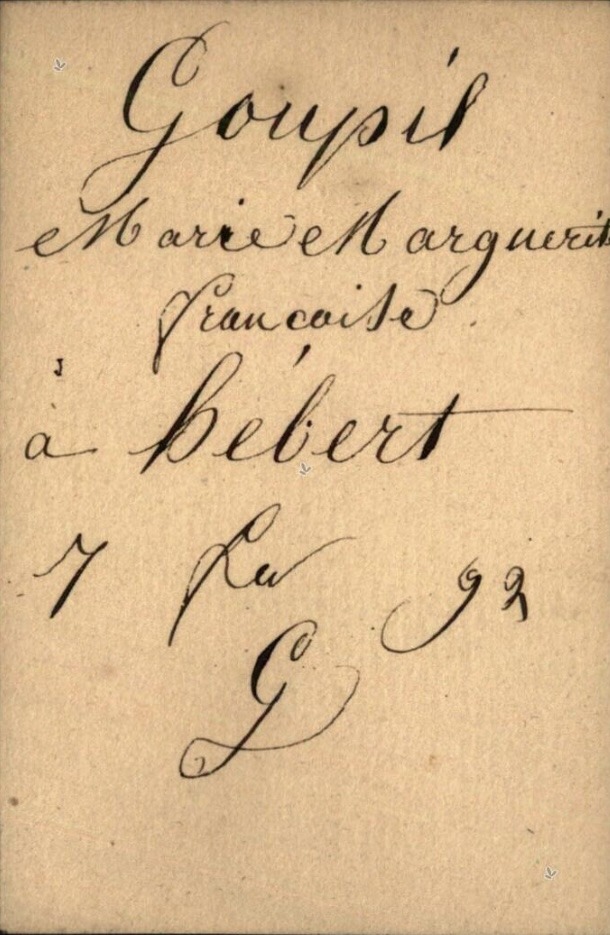
According to the same Prudhomme, Hébert was however not heads over heels in love with his wife:
[Hébert] married more to appear to have carried out an act of good citizenship than out of esteem and love for his wife. Nevertheless, they got along quite well, although she was ugly. It was a large spider that came out of the convent of the Assumption or the Annunciation. […] A wonderful revolutionary frenzy took hold of the couple, and they were faced with the people, who shouted bravo!
Hébert’s own letters would however appear to contradict this:
My situation, although difficult given the immensity of occupations with which I am responsible, becomes happier every day. I must inform you, my good friends, of the alliance that I am contracting with a very amiable young lady of excellent character. It would be enough of these advantages and were she devoid of all resources, the one I love would not be any less dear to me; but to fill my happiness I find enough fortune with my wife to be reassured about her fate if death separates us. I therefore ask you, my dear sister, to give me your approval and to ask the same from Boissierre. […] I am very assured that you will sympathize with my lovable pretender. She is very spiritual. Speaking in the old style I would say that she is comme il faut, but as I have been assured that you are as patriotic as me I only use constitutional expressions. This demoiselle is called Goupil: she has spent her entire life in the convent up until now. By her personal qualities and by the advantages she enjoys she could claim to someone much richer than me; but my good fortune gave me preference over several competitors. You see, my good friend, that not everything in life is bad and that fate has finally tired of persecuting me and through consistency I have been able to create a pleasant and lucrative position for myself.
Hébert in an undated letter to his sister, written somewhere in 1791
I am healthy and very happy. United with a woman who combines all the good qualities with the charms of the mind, whose education is completed, whose character is perfect, I lead the sweetest and most peaceful life.
Hébert in an undated letter to his sister, written somewhere in 1792
Réné Desgenettes, who in his memoirs claimed to have met Hébert in late 1791 (though it was most likely early 1792) also hints at a loving relationship:
After my return to Paris, by the end of 1791, I had met at la Grave, or rather under the Saint-Jean arch, my fellow patriot and almost fellow student Hébert, who showed me with satisfaction his feelings over seeing me again, how much he had often regretted that I had been absent from the capital during the first days of the revolution.
”You would have surely played an important role,” he told me, ”but now that you’re here everything is almost over. I live pretty close to this place, rue Saint-Antoine, opposite the passage of this name, which leads to rue du Roi des Deux-Siciles. My little apartment is on the third floor at the front. I have not at all forgotten your constant kindness or what I owe you. I want to speak of money so generously lent, because I would not dare to recall and could not count how much you often gave me at the traitors of the rue de la Parcheminerie, de Mâcon and de la Grille du Carrousel. Without you and the honest patriots from rue des Noyers, I would have starved to death… I can’t say, monsieur, which hours I will be at home, where I still dine everyday, and where I would consider myself both happy and honored to find you. But you will be sure to always find my wife there, because I’m married. Madame Hébert is a former nun from Conception-Saint-Honoré, young and very spiritual. Despite her burning patriotism, she has kept a lot of piety, and considering I love her so much, I never contradict her on this point, contenting myself with a few jokes.” I never answered to this invitation, nor did I find the occasion to see Hébert again after the end of 1791.
From the summer of 1792, we have two letters Françoise wrote to her husband’s sister, which they too seem to indicate a happy marriage:
To mademoiselle Hébert the older in Alençon
Paris, 24 July 92
We were firmly convinced, my husband and I, that you received the newspaper as well as Mr. Desnos. M. Hébert had taken all the necessary means for this; but we had the misfortune of associating ourselves with the biggest rascal in Paris, who deceives us in every way. It is therefore not surprising that you were deprived of the papers he was responsible for sending you. We are ready to leave him and you will receive what you want without fail, I hope. We would already be on top of our affairs without this man, hardly worthy of a partner as upright as my husband, who has been fooled ever since he started working; but whose well-known probity and frankness made an infinitely honest young man desire his association. So we will work through new charges and I hope that this time we will not be unsuccessful. If M. Hébert is good enough to make his happiness consist in having me, it is indeed me, mademoiselle, who without grace can certify that I am perfectly happy with he who never ceases to everyday give me new proofs of his tenderness. I have carried a precious token of him in my belly for three months now, he wants the child to look like me, and I want it to look like its father, this, mademoiselle, is the continual subject of our differences. We agree more willingly on the desire to have you as a witness of our love, it will not be up to us unless it happens soon. You are very worried about the dangers of the fatherland. They are imminent, we cannot hide them: we are betrayed by the court, by the leaders of the armies, by a large part of the members of the assembly; many people despair; but I am far from doing so, the people are the only ones who made the revolution. It alone will support her because it alone is worthy of it. There are still incorruptible members in the assembly, who will not fear to tell it that its salvation is in their hands, then the people, so great, will still be so in their just revenge, the longer they delay in striking the more it learns to know its enemies and their number, the more, according to me, its blows will only strike with certainty and only fall on the guilty, do not be worried about the fate of my worthy husband. He and I would be sorry if the people were enslaved to survive the liberty of their fatherland, I would be inconsolable if the child I am carrying only saw the light of day with the eyes of a slave, then I would prefer to see it perish with me. I gave Mde Pelletier the papers for you that I haven't through up much since M. Desnos left.
I have the most ardent desire to see you.
Mademoiselle and dear sister
Your very humble servant
Goupil… Hébert
My husband tenderly embraces you as well as your sister, whom I beg you to accept the assurance of my very sincere feelings.
To Mademoiselle Hébert the older.
Rue de la Mairie, Alençon, département de l'Orne.
Mademoiselle and dear sister-in-law,
I don't know what to attribute your long silence since last time I had the pleasure of writing to you; but it surprises and distresses me, I would have already complained if my since five months back very bad health would have left me that possibility. My husband, who was chosen by his section to serve as city commissioner on the night between August 9 and 10, has run the greatest of risks. He had the pleasure of rendering services to his fatherland, and always with that noble disinterestedness that you know from him. He has done and still does good without respite, he has seen and still sees intrigue rise up, and modestly remains Père Duchesne, a poor newspaper seller. He stood for election and was undoubtedly well worthy of becoming a member of the Convention; but he believed he had to hide nothing of the truth, more than once he made the intriguer who enjoyed a great reputation turn pale, he seemed too pure and too formidable to those who had influence in the nominations, and to the great astonishment of the brave sans-culottes, he himself is still a brave sans-culotte, which is enough for my happiness. Satisfied to know my husband was worthy and capable of doing anything to be satisfied, his hands remained pure like his soul and were not soaked in the blood that flowed in the prisons. For my part, I suffered from such a great horror that I almost lost my life; I believe that the law alone can strike down the guilty, and until then I will cover them with my body. All that can console me in this tragic event is that the names of those who are its authors are already in execration and that history by transmitting them to posterity will justify the people of Paris who has lost nothing (it must be said) of its urbanity. You would oblige me infinitely if you could tell me if the former Viscount the huntsman Lord of Carrouge has emigrated. I suspect that he has and if I was certain of it I would put an opposition against his property as he owes le 600 livres. My husband, who loves you very tenderly, says a thousand tender things to you and to your sister, and I ask you to believe me, both of you, with a very sincere attachment.
Mademoiselle and dear sister-in-law .
Your very humble, .
Servant G... HÉBERT.
My address from now on will be:
Cour des Miracles rue de Bourbon Ville Neuve.
A few months later, Réné Desgenettes claimed to have run into Hébert and been invited to dinner yet again, and this time he did follow through with it, resulting in this very long anecdote:
On February 24 1793, I spotted him, on rue Saint-Honoré, part of the procession bringing the remains of Pelletier de St-Fargeau to the Panthéon. […] Hébert, who had noticed me as well, dispatched himself from the group, approached me, shook my hand roughly and said: ”Where in the devil’s name do you live?”
”Rue du Paradis au Marais, n. 3.”
”I have important things to tell you and still live on rue St-Antoine.”
I still refrained from visiting Hébert. However, after a very few days, I learned that a gentleman of fairly good appearance, well dressed and calling himself substitute deputy of the Commune, had come to ask for me, and that he seemed upset for not having met me. Thinking there was no way to back down, the next day, around five o’clock, I went home to Hébert, where I found his wife, the former sister Goupille [sic], who, while waiting for her husband, occupied herself with preparing a rather delicate dinner, because the orator loved good food. Madame Hébert received me very well and told me her husband so many times had spoken of me with affection, that we were two old acquaintances. I approached to contemplate an engraving based on the beautiful painting by Titian or Paul Veronese, showing Jesus Christ with two of his disciples at Emmaüs’, when I noticed that Hébert below it had written: the sans-culotte Jesus dining with two of his disciples in the castle of a ci-devant…
”Here you see,” Madame Hébert told me, ”one of these bad jokes my husband often allows himself to make against religion, as a result of a detestable habit I have no hopes of curling him from... I am, monsieur, very much attached to Christianity… It’s our religion at its most beautiful, because I don’t subscribe to everything… I preach to the Jacobins, in the society of our sisters, the same doctrine that abbot Fauchet preach to our brothers at their reunions. He is a great and true apostle who inspired me with a perception of the enthusiasm which animates him, and I have reason to believe that he is also not dissatisfied with the zeal with which I seek to imitate him. I know all the advantages that the Bishop of Calvados has for me; he owes them to nature and to his superior talents, because he is a very handsome man, and everyone agrees that he is also very eloquent.”
Hébert arrived at six o’clock. Before sitting down at the table, where we then stayed for three hours, he took from a secretary a certain number of gold francs, which he handed over to me like an old debt with a thousand thanks. […]
Let us [said Hébert] speak a bit about Alençon and the first time of our youth. Madame Hébert will see that I have hidden nothing from her about the time of my life when it has been claimed that I was a scoundrel. You surely remember, monsieur, that upon leaving college, where I quite simply had the well-deserved reputation of being lazy and mischievous, I had the misfortune, or perhaps the good fortune, to fall out with la justice?
R.D.G: I remember it well.
Madame Hébert: But that is always very grave.
Hébert: This was also very grave, because the bailiwick of Alençon condemned me to banishment; but I appealed to the parliament of Rouen, which did not confirm the sentence of the first judges.
Madame Hébert: I’ve only ever known of this in a rough and very imperfect way.
Hébert: Well, you will know, my good friend, that in the town where monsieur and I were born, women have always had a great reputation for gallantry. Now the widow of an apothecary, who had been accused of bigamy, had in turn many lovers. In the front line there was a doctor who was very handsome, and after him, living under the same roof as the lady, was her premier garçon, as they expressed it then, and then finally the man who managed the very busy pharmacy. A rivalry which existed secretly between the doctor and the pharmasist broke out one day with so much fury that the doctor murdered his rival...
Madame Hébert: The horror! How did he kill him?
Hébert: The doctor took an iron or copper pestle, and delivered several strong blows to the head and across the face of my poor friend L..., who was on the point of being trepanned. However, even before public rumor got around, the king's prosecutor was seized as suspect in this criminal matter, it was dormant or rather stifled by a transaction which was attributed throughout the city to the conciliatory spirit of M. Desgenettes, your respectable father. Doctor Cl.... however, had aggravated his crime, because he was closely pursued, it is true, sword in hand, by the brother of L..., employed on the farms, he had tried twice to kill him. Outraged with rage upon learning that just revenge was going to elude the L... brothers and their friends, I drew up a note which was posted at the doors of the main church, the commissary, the courts and other places.
Madame Hébert: What did it say on the note?
Hébert: It said: ”Sentence rendered to the Supreme Court of Honor which condemns Doctor Cl... to the pillory of infamy, for compensation, etc. Then I drew two bloody knives in a saltire, with this motto: Olim veneno, nunc cultro.”
Madame Hébert: Which means?
Hébert: Formerly with the poison, now with the knife.
Madame Hébert: Is that right, M. Desgenettes?
R.D.G: Yes, madame, and if you want a different version: ”He has replaced the knife with the poison.” Nevertheless I must have the honor of observing to you, as your husbands already knows, that the doctor did not use the knife.
Hébert: The knife made Cl... more odious, and that's what I intended. The assassination is therefore tolerated by a court which had just hanged two unfortunate people, for having burglarily stolen forty sous from a church trunk, which I would happily call provocative, since it jutted out onto a main road. The veil of oblivion is extended over a crime that was to be punished by the torture of the wheel, and here I am, for a placard which repaired the wrongs of justice, extraordinarily prosecuted, and decreed for personal adjournment . This is not yet enough, and both God and the devil are invoked against me.
Madame Hébert: You are aware, my friend, that all justice emanates from God; but the possible intervention of the devil in a judgment rendered by men is a superstition that I reject, although you have sometimes regarded me as superstitious. Monsieur, she said, addressing the author of these Memoirs, I am not superstitious, but no one is more penetrated than me by the power of God and the ineffable benefits of the religion of Jesus Christ... Is it not the Savior who said to men: You are the children of the free woman? I have never blushed over my [connection to] the first estate, and admit it in front of everyone. I still keep, and you have it before your eyes, the bed that I had at the Assomption; when it becomes that of a mother, it will change in neither shape nor color... My principles are still the same as those of Sister Goupile [sic]. But, tell me, Hébert, please, how was Satan brought into your business?
Hébert: Because it was brought before the official of Seez, and the general vicar and canon of the cathedral, who presides over this ecclesiastical tribunal, launched a monitory against me. This act fulminated in the sermon in the parish church of Notre-Dame d'Alençon, with an apparatus and ceremonies borrowed from the inquisition, which filled the common people with terror, and part of the population barricaded themselves in their homes, at the the onset of night, while the proud men of the city, and especially the armed butchers, searched everywhere for the werewolf. You know, monsieur, that they are a brutal and even ferocious type of man. The fanaticism of butchers has long been maintained in our city, by making them appear with their cleavers and their dogs in the procession of the little Corpus Christi, in memory of the assistance they had given, in 1500, to the Catholics against the Calvinists, then very numerous and very powerful in our country. Do you remember, monsieur, seeing this ceremony?
R.D.G: Yes, monsieur, and to have seen at the head of the butchers, with his sword raised and his arm bare, a Malêfre. This gentleman who, I believe, lived in Seez and had a stronghold at the gates of Alençon, was descended from the one who first commanded the butchers in this ceremony. The dogs had been removed, because they bit those of the assistants who stepped on their feet, and because they howled in a terrible manner when the culverines of the castle came to shoot to salute the Blessed Sacrament.
Hébert: If the butchers, who were pleased by my known cheerfulness, had suspected me of being the author of the placard, I would have been very uncomfortable, and if they had been convinced of it, I would perhaps have been treated like the werewolf that they wanted to skin like a calf... Barricaded at the house of my poor mother, who borrowed books for me from all directions, I acquired this profound knowledge of history that deigned to grant me. My misfortunes in Alençon, repaired a little in Rouen, led me to Paris, and you know, very roughly, what the rest of my life was like.
Madame Hébert: It was during your debut in Paris, my dear friend, that you were the most silent…
Hébert: However, I had no reason to keep silent about the fact that for a long time I had struggled with the devil by the tail, even up to the time when I obtained a small job as a tobacconist at the Théâtre des Variétés. Yes, I suffered from hunger, thirst and cold for a long time. You are not unaware of the services rendered to me by Monsieur; I also had many obligations to the Parisot hairdresser on rue des Noyers, as well as to his wife. This graceful couple reminded us of the wigmaker, the Love of the Lutrin, and his wigmaker... We still had charming neighbors, the two daughters of the butcher across the street from Saint-Jean-de-Beauvais... Then, close to that of the English, this woman who loved you so much...
Madame Hébert: Is it so, monsieur, that you also have a good friend (girlfriend) in the quarter?
R.D.G: No, madame, but I often chat with a rather laughable old woman, who ran a tobacco shop and housed two or three students. The house, which was no more than fifteen feet wide, as deep, and yet five stories high, had belonged to the father of J.-B. Rousseau, who was born there on April 6, 1671. The good woman in question, who daily and naively repeated that she had once been young and had always haunted minds, had written on her door: This is where Rousseau was born.
Arriving quickly at the first days of the revolution, Hébert began to talk about how he had determined to write in a genre which was neither in his taste nor in his habits, but which he considered as having a powerful effect on the popular masses. Everyone believed that Père Duchesne was an essentially crude man; one will believe that by reading his papers, and one will be wrong, because he was, on the contrary, very polite. The conversation, which changed subject at every moment, because Hébert had little consistency in ideas, focused on Louis XVI and his family, whom the substitute of the commune had seen very often since August 10 at the Temple. At first he spoke of the dethroned monarch as a vanquished man who did not inspire him with any kind of interest. However, the day when Garat the younger, as minister of justice, and Grouvelle, as secretary general of the executive council, notified and read the final judgment to Louis XVI, he shared the emotion that this great misfortune caused them... He attended the execution, and recounted the circumstances with marked infidelity... After believing for a moment, he said, that he was going to persuade the people, Capet showed the greatest cowardice and began screaming like a calf... He had to be dragged to be placed under the blade…
R.D.G: What you say, monsieur, is in complete opposition to what thousands of men have seen and heard... The resignation of Louis XVI is a historical fact which cannot be altered, and we will not forget this resignation more than the sublime words of Father Edgeworth, which must have inspired him.
Madame Hébert: This is true, and if Louis Capet, like we believe, was a tyrant, we must today, and after his death, consider him as a martyr to his position, and I too would perhaps invoke him.
Hébert: My good friend, what extravagances... Women almost never listen to anything other than imagination and rarely to reason. Anyway, he said (and he pulled a bloody handkerchief out from his pocket), look at his blood… I gathered it while it was flowing from the scaffold… I won’t believe, monsieur, in the success of the revolution, until I’ve seen that the Swiss have been disarmed and had their throats cut, that the statue of Henri IV has been toppled and the head of Louis XVI off. […] In desiring, monsieur, to have the honor of speaking to you, I was moved by a motive more important than the subjects of which we have spoken so far. My gratitude to you makes it my duty to warn you of what is happening regarding Mr. de V..., your uncle, and his friends. You are perhaps aware that they have declared themselves enemies of the municipality of Paris, which has little fear of them and accepts combat, even to the death.
R.D.G: Monsieur, I am not in my uncle's political confidence... He has the rigidity of a Cato, and I cannot tell him anything.
Hébert: The statesmen, sir, have spoken of our heads... The municipality will ask for theirs, if necessary, and the people will grant them.
R.D.G: I thank you, monsieur, for your communications, but I cannot use them and consider them useless.
When we seperated, it was more than nine o’clock, and I never saw Hébert or his wife again.
In his testament, François Chabot, who was among the ”indulgents” executed on April 5 1794, claimed that Françoise was ”very close with [Joseph] Delaunai's [sic] mistress for more than two years as far as I’m aware, and my brave colleague Forestier saw them together occupy themselves with my trial at the time when the faction doubted my will to serve it…” How much truth there is to this is probably impossible to know.
On March 14 1794, four a’clock in the morning, Jacques-René was arrested and taken to the Conciergerie prison. Françoise stayed behind at their apartment, watched over by a guard as seals were placed on her husband’s papers. However, at six o’clock the same evening, she too was arrested and brought to the women section of the same prison as her husband. Before leaving, she handed over her watch and a pair of earrings to her ”woman of trust” Marie Gentille.
I’ve not been able to track down the arrest warrant for Françoise, but I suppose it was issued by the Committee of General Security, as I couldn’t find anything in Recueil des actes du Comité de Salut Public. The act of accusation proclaimed her suspected of being ”conspirator with her husband, immediate agent of the system of corruption imagined by the horde of foreign bankers against a few unworthy representatives of the people, accomplice of Kock, du Frey, Despagnac.” The draft of the public prosecutor's indictment did in its turn state that ”The widow Hébert has, I do not say perverted her husband, whose immorality has been demonstrated to you, but supported with all her means the liberticidal projects of this monster.”
Ten days after the two had been arrested, March 24 1794, Jacques-René was executed alongside 17 other ”hébertists.” In Paris révolutionnaire: Vieilles maisons… there is to read (though without any source cited) that with her husband dead, Françoise asked to go back to their child, but that this request was ignored. Two weeks later, April 9, Françoise was joined at the Conciergerie by the fourteen years younger Lucile Desmoulins, who had been arrested on the fourth and widowed just a day later. The two women supported each other and became friends despite the antagonism their husbands had held for one another while they were alive:
A few days later we saw her arrive, [Desmoulins’] widow so lovely and so gentle, she was still inside the vertigo and pain, she walked and watched like Nina. Oh what bizarre a game revolutions are! The widow Hébert and the widow Camille Desmoulins, who’s husbands had just been sent to the scaffold, often sat together on the same stone in the heart of the Conciergerie and cried together.
Mémoires sur les prisons (1823) by Honoré Jean Riouffe, page 66.
I saw at the registry of the Conciergerie, the day after their appearance at the hearing, and the very day of their trial, the wives of Hébert and Camille together. Hébert’s wife said to Camille’s wife: ”You are real lucky, you, there was not a single statement against you yesterday; no shadow of suspicion cast upon your conduct; you are no doubt going to go out by the main staircase, while I will be sent to the scaffold.” The wife of Camille, no doubt imbued with the atrocity of her judges, did not raise her eyes, showed neither fear nor hope, but modestly awaited her judgment. She went up a few minutes later; the debates had been closed the day before; the hearing was held only for the pronunciation of the judgment; she was condemned like the others and executed. I recall this conversation as precious, because in coming from the mouth of the wife of Hébert, in the presence of several people, it has a character of truth which gives an idea of the innocence of the wife of Camille, and of the barbarism of the court.
A witness during the trial of Fouquier-Tinville 1795. Cited in Histoire parlementaire de la Révolution française… volume 34, page 427
Françoise and Lucile were both part of a group made up of 26 people, all accused ”of having, in complicity with the infamous Hébert, Clootz, alias Anacharsis, Ronsin, Vincent, Mazuel, Momoro, Camille Desmoulins, Danton, Lacroix and others, already struck by the sword of the law, conspired against the liberty and security of the French people, by wanting to trouble the state through civil war, by arming the citizens against one another, and against the exercise of legitimate authority, as a result of which, during last ventôse and current germinal, conspirators were to dissolve the national representation, assassinate its members and the patriots, destroy the republican government, seize the sovereignty of the people, and give a tyrant to the state.” Their trial began on April 10, and continued for three days. Looking over the protocol, these are the only times I’ve found where the proceeding concerned Françoise:
Louis-Claude Adnet, cavalry captain, testifies that, during Momoro's arrest, the latter told him that Barras was a good citizen; that Hébert’s wife was asking for news the day before it; that it is absolutely true that this Barras should have been made lieutenant-colonel of the gendarmerie, as a price for his crimes, and that he bragged about it to several people.
These facts are denied by Barras and Hébert’s wife, who are convinced by other statements to the same effect.
[…]
Finally, from the last depositions in this affair, it appears that about two months ago Chabot said: You are complaining about the scarcity of provisions, about their lack of arrival. If you sincerely want to put an end to all these evils, to bring back abundance, arrest the leaders of the conspiracy, who are Hébert, his wife, and Baron de Batz. The same witnesses declared having found themselves at dinner with Hébert and his wife, and having heard them utter the most atrocious insults against Robespierre and the Committee of Public Safety; that Hébert’s wife in particular indulged in the most indecent rants against the Committee of General Security and all kinds of authority; that in a session at the Cordeliers, where the question was raised as to whether the Rights of Man would be unveiled; on the petition of Collot-d'Herbois, representative of the people, sent commissioner on this subject, she said to the people placed near Hébert, on the questioning made to her relating to said Collot-d'Herbois and his patriotism: This Collot is nothing but an intriguer, an actor who comes to try his talent for theatrical stunts; he is paid by the Jacobins to demand the uncovering of Rights of Man; but we who are not millionaires do not pay; finally the same witnesses said that the wife of Hébert daily preached the sation and subversion of the most sacred principles, and spoke about the revolution as being the first of its declared enemy.
Hébert’s wife was content with denying all these facts; she claimed to have never known her husband to be a conspirator, if he was he would have died by her hand; and the witnesses for their part persisted in their statements against Hébert’s wife.
Immediately after this last deposition, the debates were closed and sentences handed out. The tribunal found Françoise and 18 of the other accused guilty of being part of a conspiracy attempting to ”trouble the state through a civil war, by arming the citizens against each other and against the existence of legitimate authority, as a result of this, as a result of which, in the course of the last ventôse, conspirators were to dissolve the national representation, assassinate its members and the patriots, destroy the republican government, seize the sovereignty of the people, reestablish the monarchy and give a tyrant to the state.” They were sentenced to death and to have their belongings confiscated by the state.
Shortly after the sentences had been passed, Françoise did however declare herself to be around three months pregnant:
Second year of the French Republic
24 Germinal, half past four in the afternoon. On the notice given to the public prosecutor that the widow Hébert, who has just been condemned to death by today’s judgment, had a pregnancy declaration to make, we, François Joseph Denizot, judge at the revolutionary tribunal, assisted by Robert Wolff, clerk commissioner, in the presence of Citizen Nautin, one of the public prosecutor’s substitutes, are transported to one of the rooms of court house of the Conciergerie where said widow Hébert had been brought. She declared that her name was Marie-Marguerite-Françoise Goupil, widow Hébert, and that she is approximately three months pregnant. She signed with me, the aforementioned Clerk and the other aforesaid. / Widow Hébert
This claim was however quickly dismissed and/or disproven, and Françoise got driven to the scaffold the very same day, dying at the age of 38. The execution got described the following way in number 146 of the journal Nouvelles politiques et étrangères (April 15 1794):
The conspirators condemned by the Revolutionary Tribunal were executed yesterday [sic] at a quarter to seven [in the evening]. Chaumette, sitting next to Gobel, replied with a smile of rage to the reproaches of atheism that were made against him; Gobel was gloomy, silent, downcast; pale Dillon sat beside Simon; the actor Grammont next to his son; the widow of Hébert and that of Camille Desmoulins, elegantly dressed and maintaining composure, were chatting together. Gobel and Chaumette were the last to suffer their ordeal. Chaumette's head was shown to the people, to the sound of applause and cries of "Vive la République.” The wife of Hébert and the wife of Camille Desmoulins were the first to climb the scaffold, they embraced each other before dying.
The Héberts only child, Scipion-Virginie, was born in February 1793. Her birth record (cited within Mémoires de la Société historique, littéraire et scientifique du Cher) goes as follows:
February 8, 1793, birth of an unbaptized female child who one wishes to call Scripion-Virginie, born on the day and time of yesterday, at 11 a.m, in Paris, Cour des Miracles, daughter of Jacques-René Hébert, man of letters and substitute for the Commune prosecutor, and Marie-Marguerite-Françoise Goupil, his wife. First witness: Anaxagore Chaumette, man of letters and prosecutor of the Commune, living in Paris, rue du Paon n 3. Second witness: Scipion Duroure, man of letters and municipal officer, living in Paris, rue de Buffaut, faubourg Montmartre, n° 506, designated godfather. Third witness: Marie-Jeanne Doity, widow of Paul-François Maillard, living at Grande-Rue, faubourg Saint-Martin, n° 37, designated godmother.
Signed, M.-J. Doisy, Scipion Duroure, — Hébert, — Bourner, — p. g. Anaxagore Chaumette.
According to the article La Fille d’Hébert (1947), Scipion’s godfather (who, as it can be seen, was also the one she was named after) was imprisoned just four days after her parents (he would however escape the guillotine and be set free on September 27 1794). After the death of her mother and father, Scipion-Virginie was therefore taken in, not by him, nor by her godmother, but instead Françoise’s older half brother J-J Goupil. On March 12 1795 we do however find a decree handing tutorship over to ”Jacques-Christophe Marquet, printer, Rue de Vaugirard,” and it was under the eyes of him and his wife Anne (married August 29 1794) that Scipion-Virginie grew up. On October 7 1808, at age 15, she got baptised in a religious baptism as seen by the following decree:

On December 9 1809, at the age of 16 years and ten months, Scipion married the nine years older priest’s son Léon-Frédéric Née from Bohain. She was by then working as ”institutrice” at the home of a priest by the name Masson. Scipion and Léon-Frédéric moved to Marsauceux, where the latter exercised the functions of ”minister of Saint Evangile” and where they had six children, half of which died while in infancy. Of the surviving children, Paul-Emile-Frédéric died in Paris in 1829, aged 17, Timothée died in Marsauceux in 1843, aged 19 and Frédéric-Auguste died in 1877, aged 63. The latter was the only one to marry and have a child, a son born in October 1841 that lived for less than a year. As a result, no decendant of the Hébert lineage exists today. Scipion-Virginie herself died on July 11 1830, aged 37, one year younger than her mother. Her husband remarried six years later, but did not have any more children. He died himself in 1856.
#frev#hébert#french revolution#lucile desmoulins#not the happiest story to share on christmas day but what can you do…#atheist hébert’s religious wife and deist camille’s sceptic wife becoming friends during their last days in life#despite what their husbands felt for each other#may just be my favorite bittersweet and/or so ironic it’s true fact from this period#but now i really wish robespierre being horace desmoulins ’ godfather wasn’t just a myth#so that ”my child’s godfather got arrested a few days after me.”#”well my child’s godfather signed the arrest warrant for both me and my husband”#would have been a possible conversation between françoise and lucile#ask
33 notes
·
View notes
Text

Flamehair
#myth loki#lokean#may or may not be on an art kick idk#this is one of the modern epithets ive seen floating around for him and tbh ive been meaning to draw it for AGES so here you go#casual abuse of the burn tool but lol i enjoyed the color practice#hair is still my favorite thing to draw can you tell#my stuff#artists on tumblr
111 notes
·
View notes
Text
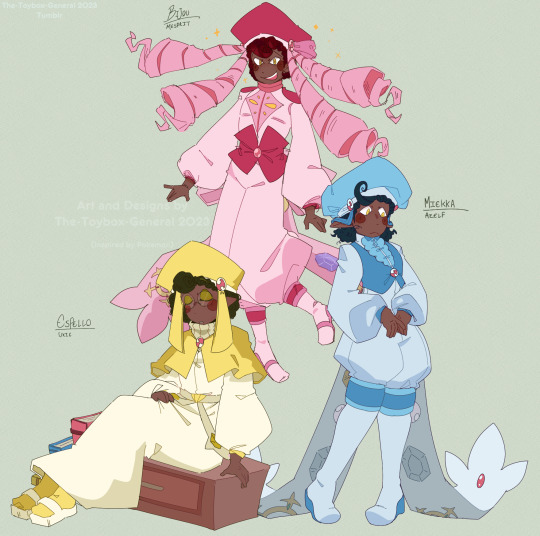



"Deeper, then deepest they alight.
From the lake floor they rise.
Bearing with them the power to make vast lands, they rise again."
My Lake Guardians won the poll !!!
They're all siblings and help keep things in check whenever needed!
The world has been so peaceful that most legendries nowadays don't have to do much, all thanks to a noble sacrifice from their father a long time ago. Not to say things haven't been stirring as of late, but whatever it is these three are sure to throw their hats into the ring to keep the peace-- even if that's just assisting the good guys!
#Whatever shape those good guys may come in... hehe#Toybox-Arts#My Art#Pokemon#Uxie#Mesprit#Azelf#Oc#Espello#Bijou#Miekka#the quoted excerpt is from a sinnoh myth in game !!#If bulbapedia did not lie to me . that is#hoping that cropping them all helped visiblity . tumblr my mysterious#They all have written bios and what-not but im not sure how to post those . if anyone is curious?!#Another day of vauge-posting about my shared pokemon gijinka story#Gijinka
82 notes
·
View notes
Text
Hera: listen Zeus we need to talk.
Hestia: I’m going to go get a snack!
Demeter: I love to snack!
Poseidon: I’m good right here.
Demeter: *smacks him on the back of the head*
#greek mythology#greek gods#greek myths#queque#greek myth memes#incorrect quotes#incorrect greek gods#hera#hestia#demeter#s: how i met your mother#<- watching it again#hera greek god#hestia greek god#Poseidon#poseidon greek god#I may have posted this before but I’m not gonna go look
61 notes
·
View notes
Note
What do you struggle with the most when it comes to making an OC?
(Mine is giving them a name. Like..... I would create a cool looking character with some personality but then, I don't know what to name them. I'm even struggling with that as we speak.)
design, absolutely design. a lot of the time i have a name / personality / role / backstory for them Before knowing what they look like. coming up with a physical look to go with the character is a bitch & a half lol
#name is tough tho! i feel your struggles!#if i may offer some advice - coming from someone who has crafted literally hundreds of brain guys#ask yourself what their vibe is#like... do you think their name is short? do they seem like someone with a long name? an abbreviated name like A.J?#maybe they look like someone whose name starts with 'h'#look up h names and go from there#or another method is a bit tougher but hey it kinda works#clear your mind and look at the character#the first name that pops into your head is often the best choice#or yk... just sit there thinkin about them! maybe they're like. idk a bird#bird > birdie > birdly > billie#billie the bird!#ALSO LOOK UP BABY NAMES#there are sooooo many lists#you can look up lists with specific amount of letters. starting with [insert letter of your choice]. names with nicknames.#male. female. unisex. myth-based. animal based. plant based.#THERE'S A LIST OF NAMES FOR EVERYTHING I PROMISE#rambles from the bog#for example w/ my puppet sundown summer#i chose her name bc her color palette reminds me of a sunset & she has western inspiration & she's from a kid's show#so her name would be alliterative & sound cowboy-ish. sundown is more western than sunset#and then throw on the summer for the alliteration & friendly feel - kids automatically have positive associations with summer#see what i mean?#or take my murder man Aces - he's named after the diamond patterns on his body#(i associate the word ace with the ace of diamonds playing card)#or uhhhh i have a talking cat character named bartholomew#named so because i think it would be funny for this little talking cat to have a long & 'haughty' name that's also a cat pun. 'mew'#see there's no one way to go about it!!!#there's lots of methods and none of them are wrong!!#good luck and have fun my guy!
42 notes
·
View notes